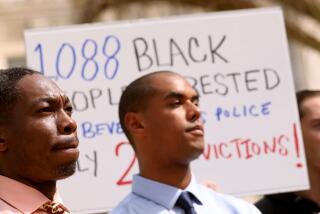Diplomatic immunity for Arab royals? Not so fast; here’s a rundown
Twice in the last month, Los Angeles and Beverly Hills police have had to reach out to the U.S. State Department regarding incidents involving foreign nationals who may have diplomatic immunity.
After a video posted online showed an exotic sports car speeding down Beverly Hills residential streets, where it weaved around vehicles and through stop signs as pedestrians looked on, investigating officers were approached by a man who claimed to be the car’s owner and said he had diplomatic immunity.
Then last week, Los Angeles police went to a $37-million compound in Beverly Glen, on the edge of Beverly Hills, after someone reported a disturbance. Within hours, officers had taken a Saudi prince into custody on suspicion of a felony sex crime.
In both instances, authorities had to reach out to the State Department to determine what immunity, if any, the people involved possessed. In neither case were the people involved protected by diplomatic immunity, authorities said, but in some circumstances, a person might be.
Below is an explanation of the how diplomatic immunity works, who falls under it, and how police are expected to respond to those afforded the luxury, according to a 44-page U.S. State Department handbook.
What is diplomatic immunity?
It’s a specific level of insulation from U.S. law enforcement that varies from person to person. A diplomatic agent (think, another country’s ambassador at an embassy in Washington) enjoys the highest level of immunity, along with his or her family. The technical and administrative staff (like advisors or secretaries) and their families are a level below that, followed by service staff, which has the lowest level of immunity of anyone on the diplomatic staff.
Do any of those apply to the car owner in Beverly Hills or prince in Beverly Glen?
They do not appear to. Even if either person worked out of their respective country’s consulate in Los Angeles, that would be consular immunity, which is different than diplomatic immunity.
What are the types of immunity available?
For diplomatic agents and their families, immunity is virtually all-encompassing. They cannot be handcuffed, arrested, detained and neither they nor their property or vehicles can be entered or searched. They “cannot be prosecuted no matter how serious the offense,” unless their home country waives their immunity, the handbook says. They cannot be sued unless it involves behavior or a deal outside their scope as a diplomat.
Technical and administrative staff get the same criminal liability protection but have no civil immunity unless it’s related to their official diplomatic mission. Service staff only have immunity from official acts on behalf of the diplomatic mission.
See the most-read stories this hour >>
Each country assigns a level of immunity to their diplomats, consular officers and staff in another country. If the United States wants to prosecute one of these people, they request that the other country waive that person’s immunity. Many diplomats and their staff carry cards that identify their role in the diplomatic mission and what immunities they have.
So how is consular immunity different?
Unlike diplomatic agents, consular officers can be handcuffed, detained or arrested for felonies. Their properties and vehicles can be entered and searched. Their families are not protected.
Consular officers can be prosecuted for misdemeanors but keep their liberty. They enjoy the same criminal and civil protections afforded their diplomatic counterparts if their action is in behalf of their home country’s diplomatic mission.
Are there exceptions?
Yes. As the handbook explains, “these privileges and immunities are not absolute, and law enforcement officers retain their fundamental responsibility to protect and police the orderly conduct of persons in the United States.”
For example, a diplomat pulled over for driving drunk would not necessarily be allowed to continue driving. Instead, the officer may take them somewhere to sober up, have them call someone for a ride, or might even take the diplomat to their respective destination.
Why is there diplomatic immunity?
The State Department cites several reasons, including to allow diplomats to perform their duties efficiently, so it doesn’t complicate relationships between the United States and the other country, and to try and prevent harsher treatment of U.S. personnel abroad.
The United States is host to more than 100,000 foreign government representatives and their relatives.
When did diplomatic immunity start?
Though ancient Greek and Roman governments afforded special status to envoys, the U.S. State Department identifies its first modern implementation to the British Parliament in 1708, when the government banned the arrest of foreign envoys. In 1790, the U.S. passed its own version of the law and included lower-ranking diplomatic mission personnel.
In 1961, the Vienna Convention on Diplomatic Relations was enacted. In 1978, the U.S. replaced its old immunity law with the Diplomatic Relations Act.
For breaking California news, follow @JosephSerna.
ALSO:
Daughter of actor Paul Walker files wrongful-death suit against Porsche
Shock, mourning after MTV extreme athlete Erik Roner killed in skydiving accident
Naked man covered in blood was ‘in a zombie state’ as he tried to steal cars in Victorville
More to Read
Start your day right
Sign up for Essential California for news, features and recommendations from the L.A. Times and beyond in your inbox six days a week.
You may occasionally receive promotional content from the Los Angeles Times.







